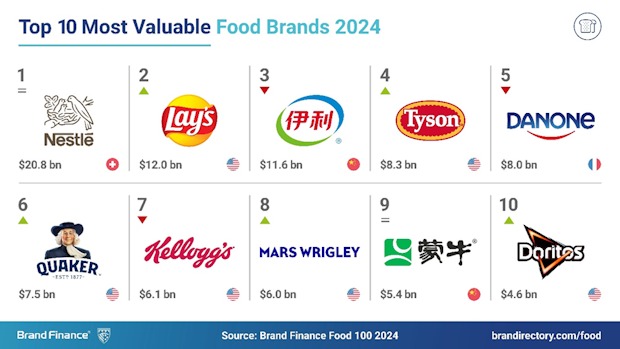Nestlé continues to hold the title of the world’s most valuable food brand, according to a new report by Brand Finance. Despite a 7% decline in brand value, the Swiss firm’s strong brand equity and resilience helped it maintain its top position in the global food industry. Brand Finance noted that Nestlé’s ability to adapt to changing consumer preferences and maintain a diverse product portfolio has been instrumental in its continued success.
Snack brand Lay’s (brand value up 9%) climbed to the second position globally, surpassing China’s Yili (brand value down 6%), which holds the third spot. Lay’s strong financial performance and innovative product offerings, such as its Flavour Swap and MAX lineups, are said to have contributed to its brand value growth.

The food and beverage sector has seen a 4% decline in brand value this year, totalling around $268bn. Brand Finance highlighted that consumers are increasingly favouring smaller, private-label brands over big names.
Savio D’Souza, Valuation Director at Brand Finance, commented: “The food and beverage industry is undergoing a rapid transformation driven by evolving consumer preferences. While the decline in brand value is a challenge, it also presents opportunities for innovation. Brands that successfully adapt to these trends by demonstrating strong brand purpose and delivering exceptional consumer experiences will be the ones to thrive in this new landscape.”
Convenience foods and dairy remain major contributors, with convenience foods thriving due to busy lifestyles of consumers and dairy staying strong thanks to plant-based options and health trends. Brand Finance noted that these shifts are challenging established brands to adapt, while new brands capitalise on changing consumer preferences.
Leading brands in this segment include Healthy Choice (brand value up 17% to $1.4bn) and DiGiorno (brand value up 17% to $1bn), both of which have successfully adapted to changing consumer preferences through innovative product releases and strategic marketing.
Amul (brand value up 11% to $3.3bn) has risen to become the world’s strongest food brand, with a Brand Strength Index (BSI) score of 91.0 out of 100 and an AAA+ rating. Amul’s brand strength is attributed to its strong performance in familiarity, consideration, and recommendation metrics.
Meanwhile, new entrant Viterra (brand value up 37% to $1.1bn) has recorded the largest brand value growth by percentage in the ranking. This growth is supported by increased volumes, strategic acquisitions, and a higher BSI score, now at 60.6 out of 100.
Looking at the non-alcoholic drinks market, Coca-Cola (brand value up 5% to $35bn) retains its title as the world’s most valuable brand in the sector.
Coca-Cola also remains the strongest non-alcoholic drinks brand, holding the ranking’s only AAA+ brand strength rating and recording a Brand Strength Index (BSI) score increase of 0.8 points to 90.4 of 100. Brand Finance noted that the soft drinks giant’s memorable marketing campaigns, such as its 2023 Christmas advertisement, The World Needs More Santas, have further reinforced its emotional connection with consumers.
The brand’s marketing investments during the 2023 financial year facilitated growth and addressed various consumer needs. Its strategic collaborations and innovative product launches, such as the ‘space-flavoured’ cola and ready-to-drink canned cocktail with Jack Daniel’s, have also bolstered its market position.
D’Souza said: “The non-alcoholic beverage industry is experiencing unprecedented growth, driven by a confluence of factors including health consciousness, changing consumer preferences, and a desire for innovative and exciting taste experiences. As consumers continue to seek out functional beverages, sustainable practices, and unique flavour profiles, the sector is poised for an exciting era of expansion.”
Four of the top 10 most valuable non-alcoholic drink brands ranked this year are carbonated soft drinks. Apart from Coca-Cola leading, Pepsi (brand value up 10% to $20.2bn) is in second place while Dr Pepper (brand value up 8% to $4.8bn) and Sprite (brand value up 9% to $4.5bn) occupy the seventh and eighth positions, respectively. The top 10 list also includes three functional drink brands, two coffee and tea brands, and one bottled water brand.




